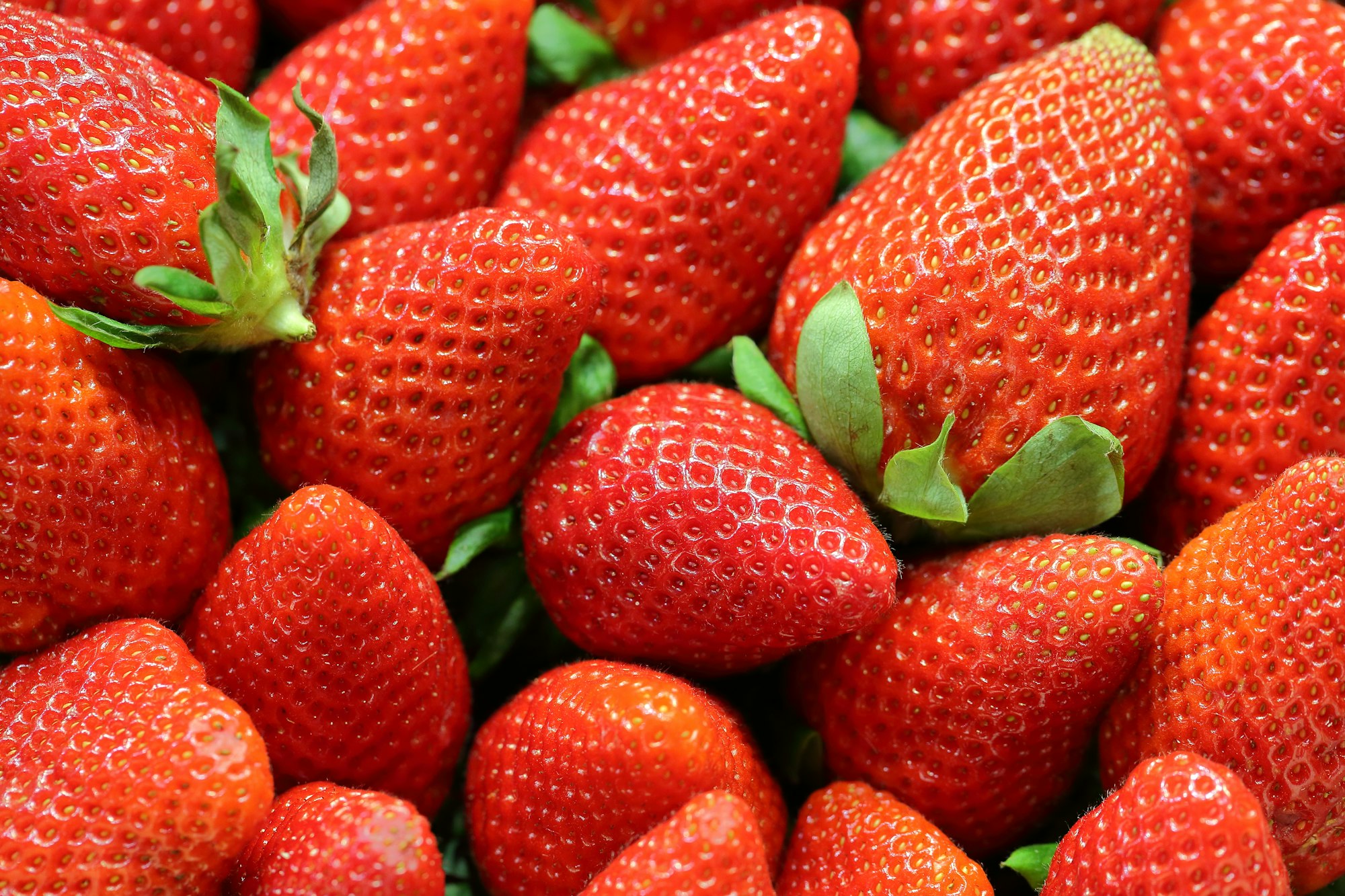Dogs, with their wagging tails and eager eyes, often spark curiosity about sharing our favorite foods with them. One common question that arises is, can dogs eat strawberries? As a responsible dog owner, it's essential to know the facts before sharing these delightful berries with our furry companions.

Nutritional Benefits of Strawberries for Dogs:
Dogs, much like humans, can benefit from the nutritional goodness that strawberries bring to the table. These delectable berries aren't just a tasty treat; they're also packed with essential nutrients that contribute to your dog's overall well-being.
1. Rich in Vitamins: Strawberries boast a healthy dose of vitamins, including vitamin C, which is known for its immune-boosting properties. This can be particularly beneficial for dogs, enhancing their resistance to common illnesses.
2. Antioxidant Powerhouse: Loaded with antioxidants, strawberries help combat oxidative stress in a dog's body. This is crucial for maintaining cellular health and reducing the risk of chronic diseases.

3. High Water Content: Strawberries contain a significant amount of water, contributing to your dog's hydration. This is especially advantageous for dogs, as proper hydration supports various bodily functions and can aid in preventing issues like urinary tract problems.
4. Low in Calories: For dogs watching their weight, strawberries make an excellent low-calorie treat. This allows your furry friend to indulge in something sweet without the risk of unnecessary weight gain.
Risks and Precautions
While strawberries can be a delightful addition to your dog's diet, it's essential to be aware of potential risks and take necessary precautions.
1. In conclusion, dogs can indeed enjoy the sweet taste of strawberries when introduced responsibly. Balancing the joy of treating your dog with the need for a healthy diet is key. By understanding the nutritional benefits, risks, and precautions, you can make informed decisions about sharing this delightful fruit with your furry companion. Just like humans, dogs can have allergies or sensitivities to certain foods. Before introducing strawberries, observe your dog for any signs of allergies, such as itching, redness, or gastrointestinal distress.
2. Choking Hazard: The small size of strawberries poses a choking hazard, especially for smaller dog breeds. To mitigate this risk, consider slicing or mashing strawberries before offering them to your furry friend.
3. Moderation is Key: While strawberries offer health benefits, moderation is crucial. Too much of any treat, even a healthy one, can lead to digestive upset or other issues. Treat strawberries as an occasional addition to your dog's diet.
How to Safely Introduce Strawberries to Dogs
Now that you're aware of the nutritional benefits and potential risks, let's discuss how to introduce strawberries to your dog in a safe and enjoyable manner.
1. Start Slow: When introducing any new food to your dog, including strawberries, start with small quantities. Monitor your dog for any adverse reactions before making strawberries a regular part of their diet.
2. Wash Thoroughly: Before offering strawberries to your dog, ensure that they are thoroughly washed. This helps remove any pesticides or contaminants that might be present on the fruit.
3. Remove Stems and Leaves: While the fleshy part of the strawberry is safe for dogs, the stems and leaves can be a choking hazard. Trim off these parts before serving strawberries to your furry friend.
4. Incorporate into Meals: Rather than offering strawberries as standalone treats, consider incorporating them into your dog's meals. Mix sliced strawberries with their regular dog food for a tasty and nutritious twist.
5. Observe for Allergic Reactions: Even if your dog has shown no signs of allergies in the past, keep a close eye on them after introducing strawberries. Allergic reactions can sometimes develop over time.
Strawberries and Canine Health:
Strawberries not only tantalize a dog's taste buds but also contribute positively to their overall health. Understanding the potential impact of strawberries on canine well-being sheds light on why these berries can be a valuable addition to your dog's diet.
1. Heart Health Benefits: Strawberries contain compounds that may support heart health in dogs. The antioxidants and anti-inflammatory properties present in strawberries contribute to cardiovascular well-being, promoting a healthy heart.
2. Anti-Inflammatory Effects: Inflammation is a common concern in dogs, especially as they age. Strawberries, with their natural anti-inflammatory properties, may aid in reducing inflammation, potentially benefiting dogs with arthritis or other inflammatory conditions.
3. Immune System Support: The high vitamin C content in strawberries plays a crucial role in supporting a dog's immune system. A robust immune system is vital for warding off infections and maintaining overall health.
4. Healthy Skin and Coat: The nutrients in strawberries, including vitamins and antioxidants, can contribute to a shiny and healthy coat. Additionally, these compounds may have a positive impact on skin health, helping alleviate certain skin issues in dogs.

Dogs with Specific Health Conditions
While strawberries offer various health benefits, it's essential to consider individual dogs with specific health conditions. Tailoring their diet to accommodate these conditions ensures a holistic approach to their well-being.
1. Consultation with a Veterinarian: Before introducing strawberries or any new food, consult with your veterinarian, especially if your dog has pre-existing health conditions. They can provide personalized advice based on your dog's unique health profile.
2. Considerations for Diabetic Dogs: For dogs with diabetes, monitoring their sugar intake is crucial. While strawberries are relatively low in sugar, it's essential to factor this into their overall diet plan. Your vet can guide you on incorporating strawberries safely.
3. Allergies and Sensitivities: Dogs with allergies or sensitivities require extra caution. If your dog has a known sensitivity, consult with your veterinarian before introducing strawberries. Watch for any adverse reactions, and discontinue if needed.
Popular Dog Treat Recipes with Strawberries
Transforming strawberries into delicious homemade treats adds an extra layer of joy to your dog's culinary experience. Here are some popular and easy-to-make recipes that your furry friend is sure to love.
1. Frozen Strawberry Delights:
- Blend fresh strawberries and pour the puree into ice cube trays.
- Freeze until solid, creating strawberry-flavored ice treats for your dog.
2. Strawberry and Oat Biscuits:
- Mix mashed strawberries with oats and a small amount of peanut butter.
- Form the mixture into small biscuits and bake until golden brown.
3. Yogurt and Strawberry Popsicles:
- Combine plain yogurt with diced strawberries.
- Pour the mixture into popsicle molds and freeze for a refreshing summer treat.
4. Strawberry-Infused Water:
- Add sliced strawberries to your dog's water bowl for a hint of flavor.
- This is an excellent way to encourage hydration, especially for dogs who are picky about drinking water.
Feedback from Veterinarians:
Understanding how professionals view the inclusion of strawberries in a dog's diet is crucial for responsible pet ownership. Veterinarians, with their expertise, offer valuable insights and guidelines regarding the consumption of strawberries by our canine companions.
1. Moderation Guidelines: Veterinarians stress the importance of moderation when it comes to treating dogs with strawberries. While the fruit can be a healthy addition, excessive consumption may lead to digestive issues or an imbalance in their diet.
2. Individual Health Considerations: Veterinarians emphasize the need to consider each dog's individual health status. Dogs with specific health conditions, such as diabetes or allergies, may require tailored advice to ensure that strawberries align with their dietary needs.
3. Monitoring for Adverse Reactions: Professionals recommend closely monitoring dogs after introducing strawberries. Signs of allergies or sensitivities, although rare, should be promptly addressed. Early detection of adverse reactions allows for timely adjustments to the diet.
4. Consultation for Special Cases: For dogs with chronic health issues or those on specialized diets, veterinarians recommend seeking professional advice before incorporating strawberries. Consulting with a vet ensures that the introduction of new foods aligns with the overall health plan for the individual dog.
Real-Life Stories
Real-life anecdotes provide a personal touch to the discussion of dogs enjoying strawberries. These stories not only entertain but also showcase the positive impact of incorporating strawberries into a dog's diet.
1. Joyful Reactions: Numerous dog owners share stories of their pets discovering the delight of strawberries. From playful curiosity to unabashed enthusiasm, these stories highlight the joy that strawberries can bring to a dog's life.
2. Improved Health Outcomes: Some dog owners report positive changes in their pets' health after introducing strawberries. Improved coat condition, increased energy levels, and even reduced joint inflammation are among the benefits mentioned in these real-life accounts.
3. Creative Treat Experiences: Dog owners often share creative ways they've integrated strawberries into their pets' treat routines. From homemade biscuits to fruity frozen treats, these stories inspire other pet owners to experiment with strawberry-infused goodies.

Common Misconceptions
Dispelling myths and misconceptions is crucial for ensuring accurate information about feeding strawberries to dogs. Clearing up these misconceptions promotes responsible and informed decision-making among dog owners.
1. Strawberries and Sugar Concerns: One common misconception is that the natural sugar in strawberries poses a significant risk. Clarifying that strawberries have relatively low sugar content helps owners make informed choices without unnecessary worry.
2. Allergy Misunderstandings: There's a misconception that dogs are frequently allergic to strawberries. Highlighting that true allergies are rare and that most dogs can enjoy strawberries in moderation without issue dispels unnecessary fears.
3. Choking Hazard Myths: Some happy dog owners worry about the choking hazard posed by strawberries. Educating them on safe preparation methods, such as slicing or mashing, helps address this concern and ensures a safer treat experience for dogs.
4. Tailoring to Individual Dogs: It's a misconception that all dogs can be treated the same way with strawberries. Emphasizing the need to tailor the introduction and quantity of strawberries based on individual health and dietary considerations helps dispel this notion.
Can Puppies Eat Strawberries?:
The introduction of new foods to puppies requires careful consideration, and strawberries are no exception. While strawberries can be a delightful addition to a dog's diet, there are specific considerations when it comes to puppies.
1. Gradual Introduction: Puppies, especially those transitioning from milk to solid food, should have new treats introduced gradually. Start by offering small, mashed pieces of strawberry and observe for any adverse reactions.
2. Monitor for Allergic Reactions: Puppies, like adult dogs, can have allergies. Keep a close eye on your puppy for signs of allergies, such as itching, redness, or gastrointestinal issues, after trying strawberries for the first time.
3. Age-Appropriate Portions: Due to their small size, puppies should be given age-appropriate portions of strawberries. It's essential to consider their overall diet and ensure that treats, including strawberries, do not compromise the balance of their nutritional intake.
4. Consult with the Veterinarian: Before incorporating strawberries into a puppy's diet, consult with your veterinarian. They can provide guidance based on the specific needs and health status of your puppy, ensuring a safe and healthy introduction to this new treat.
Strawberry Alternatives for Dogs
While strawberries are generally safe for dogs, it's beneficial to explore a variety of dog-friendly fruits to provide a well-rounded and enjoyable diet. Here are some alternatives to strawberries that you can consider for your furry friend.
1. Blueberries: Blueberries are rich in antioxidants and low in calories, making them a healthy and tasty treat for dogs. They are also small in size, reducing the choking hazard.
2. Watermelon: Fresh, seedless watermelon is a hydrating and delicious option for dogs. Remove the seeds and rind before offering small, bite-sized pieces.
3. Apples: Apples, when sliced and with seeds removed, are a crunchy and nutritious treat. They can serve as a satisfying snack for dogs.
4. Bananas: Bananas are a good source of potassium and can be given in moderation. Ensure that the banana is peeled and broken into small pieces for easy consumption.
5. Carrots: Raw, baby carrots make for a crunchy and satisfying treat for dogs. They are low in calories and contribute to dental health.
Exploring different fruit options ensures that your dog gets a diverse range of nutrients while keeping their treats interesting. Always introduce new foods gradually and monitor for any adverse reactions. If you have any concerns or questions about your dog's diet, consult with your veterinarian for personalized advice.

Conclusion
In conclusion, dogs can indeed enjoy the sweet taste of strawberries when introduced responsibly. Balancing the joy of treating your dog with the need for a healthy diet is key. By understanding the nutritional benefits, risks, and precautions, you can make informed decisions about sharing this delightful fruit with your furry companion.
FAQs about Dogs and Strawberries:
1. Can all dogs eat strawberries?
- Dogs, in general, can safely consume strawberries. However, individual tolerance may vary. Always introduce strawberries gradually and monitor for any adverse reactions, especially in dogs with known allergies.
2. How many strawberries can I give my dog in a day?
- The quantity of strawberries depends on the size and breed of your dog. As a general guideline, moderate portions are recommended. Consult with your veterinarian to determine the ideal amount based on your dog's specific needs.
3. Are there signs of strawberry allergies in dogs?
- Signs of strawberry allergies in dogs may include itching, redness, gastrointestinal distress, or changes in behavior. If you observe any of these symptoms, discontinue feeding strawberries and consult with your veterinarian.
4. Can dogs eat strawberry leaves or stems?
- It is advisable to remove strawberry leaves and stems before feeding them to your dog. The leaves and stems can pose a choking hazard, and dogs should only consume the fleshy part of the strawberry.
5. What do I do if my dog chokes on a strawberry?
- If your dog appears to be choking, remain calm. Attempt to gently open their mouth and inspect for any visible obstructions. If you can't clear the obstruction or your dog is in distress, seek immediate veterinary assistance.
These frequently asked questions provide essential information for dog owners considering strawberries as a treat. Always prioritize your dog's safety and well-being by introducing new foods cautiously and seeking professional advice when needed.






